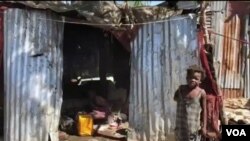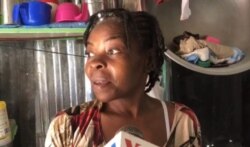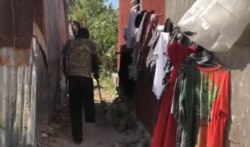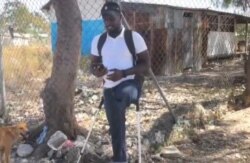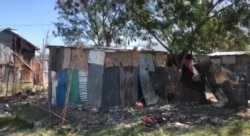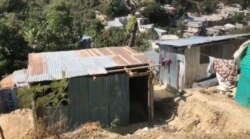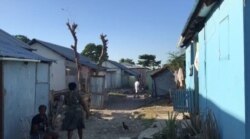WASHINGTON / PORT-AU-PRINCE, HAITI - A decade after the devastating earthquake that killed more than 200,000 Haitians and left millions more homeless life has not improved for many survivors.
Ma Drapo, Sent Mari and Taba Isa, three refugee camps located in the capital, Port-au-Prince, is where survivors are living post-quake. Residents of Sent Mari told VOA Creole they lack clean water, sanitation and food.
"We’ve been living here since January 12 (2010)," one man said. "We have no access to water, financial revenue, employment, water - there are many other things we don’t have access to - but you know how it is, we’re Haitians -wherever you’re living, there are people to support even though we don’t have the means to do that."
"We don’t have bathrooms," a woman living in a makeshift house with a tin roof said. "But when we have to go, there’s a place we walk to, to do our business."
In Ma Drapo, a refugee camp for handicapped quake survivors, residents decry the violence.
"There’s non-stop shooting, so we can’t leave in peace," a woman told VOA Creole. "We are running around all day for fear of being shot. We (have to) grab our kids and run and sometimes we don’t even know where we’re going."
A man who lost his leg in the quake said he has been living there for almost nine years now. "They don’t value us at all," he said. "We are lacking basic needs. Our homes are crumbling, government officials never visit us to see how we’re living. We have tons of problems." The man said the only good thing that has happened is that they were recently provided with electricity. Residents are grateful, but they have many other basic needs. He called on the international community to take a closer look at what’s happening with handicapped survivors.
Another nine-year resident of the camp, who told VOA Creole he is an interpreter for the deaf residents, said he had signed petitions and sent letters asking for assistance. He is still waiting for a response. "There are bullet casings everywhere, we have no security, we don’t have anything, we’re suffering," he said. President Jovenel Moise has acknowledged the lack of adequate housing for earthquake survivors and said the government is still working to rectify that.
At the Taba Isa camp, a woman told VOA Creole she had been relocated after the earthquake and has lived there ever since. "They initially told us it was for three years, but three years has become 10 years," she said. "And we have no security, we are charged with protecting ourselves and I’d like to know if they have plans to construct houses for us at some point."
The mother of two said the residents are isolated, having no access to hospitals or adequate schools for their children.
Another female resident spoke about the lack of attention. "In the beginning they were coming often to take care of us but it’s been a long time since we were visited (by government officials). We aren’t living well. If heavy rain falls, we’re at risk. Our children can’t go to school because of overcrowding," she said.
"If you’re asking about government assistance, it’s zero," a male resident said. "When we call the police station, no one comes. Even if there’s an arrest warrant out against the person we are calling them about, they just ignore our calls."
In his speech marking the 10th anniversary of the earthquake, Moise called on Haitians to unite and rekindle the spirit of unity and humanitarianism that was prevalent in the country after the earthquake hit, in 2010.
"As we face these difficult circumstances, we need this type of solidarity more than ever," Moise said. "That unity, that fraternity that was our strength, and (which) kept us from losing hope."




